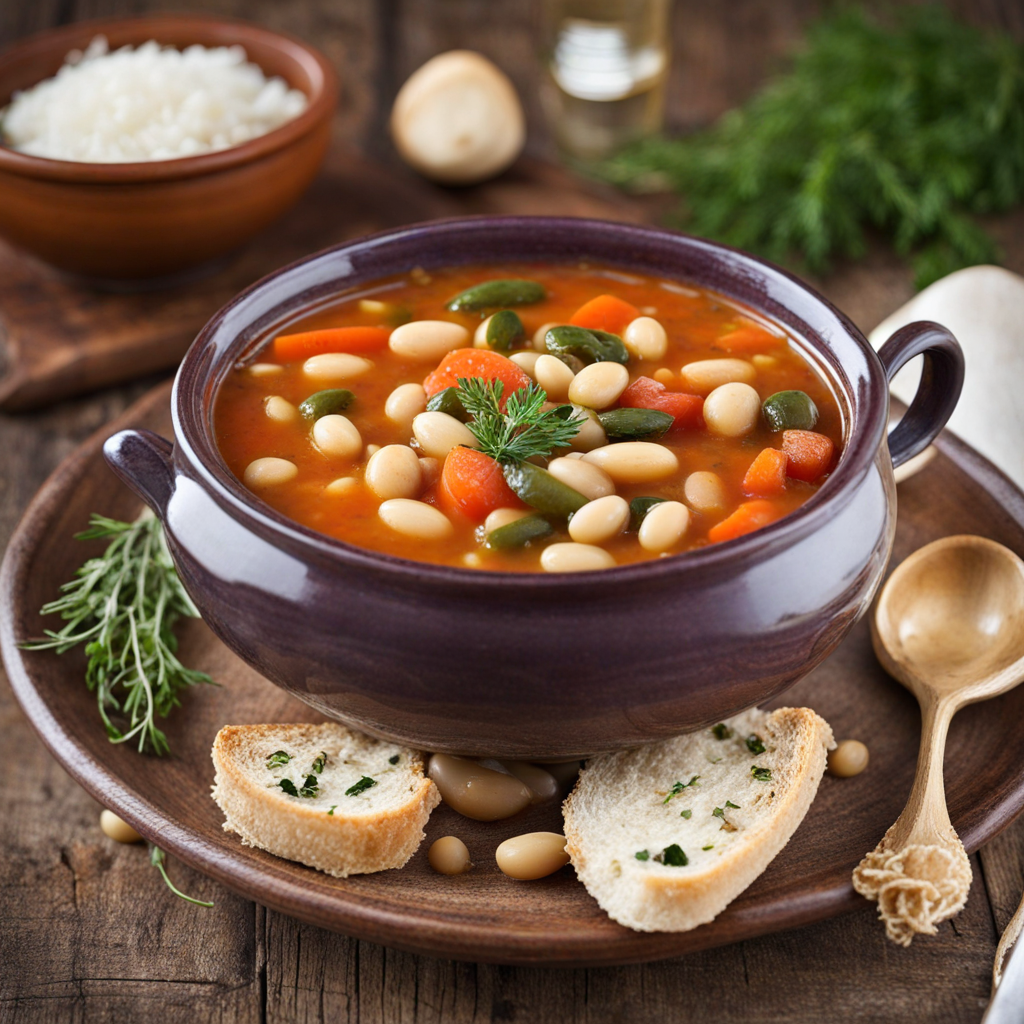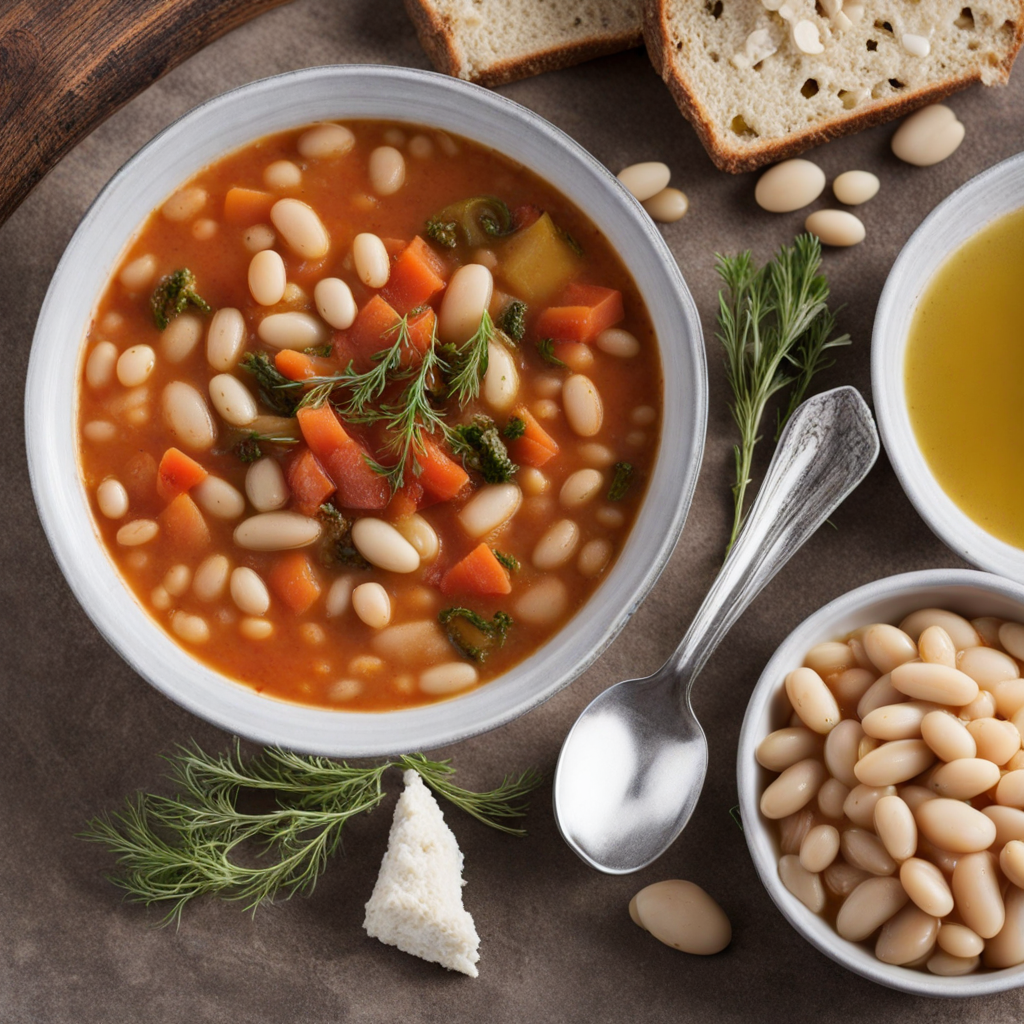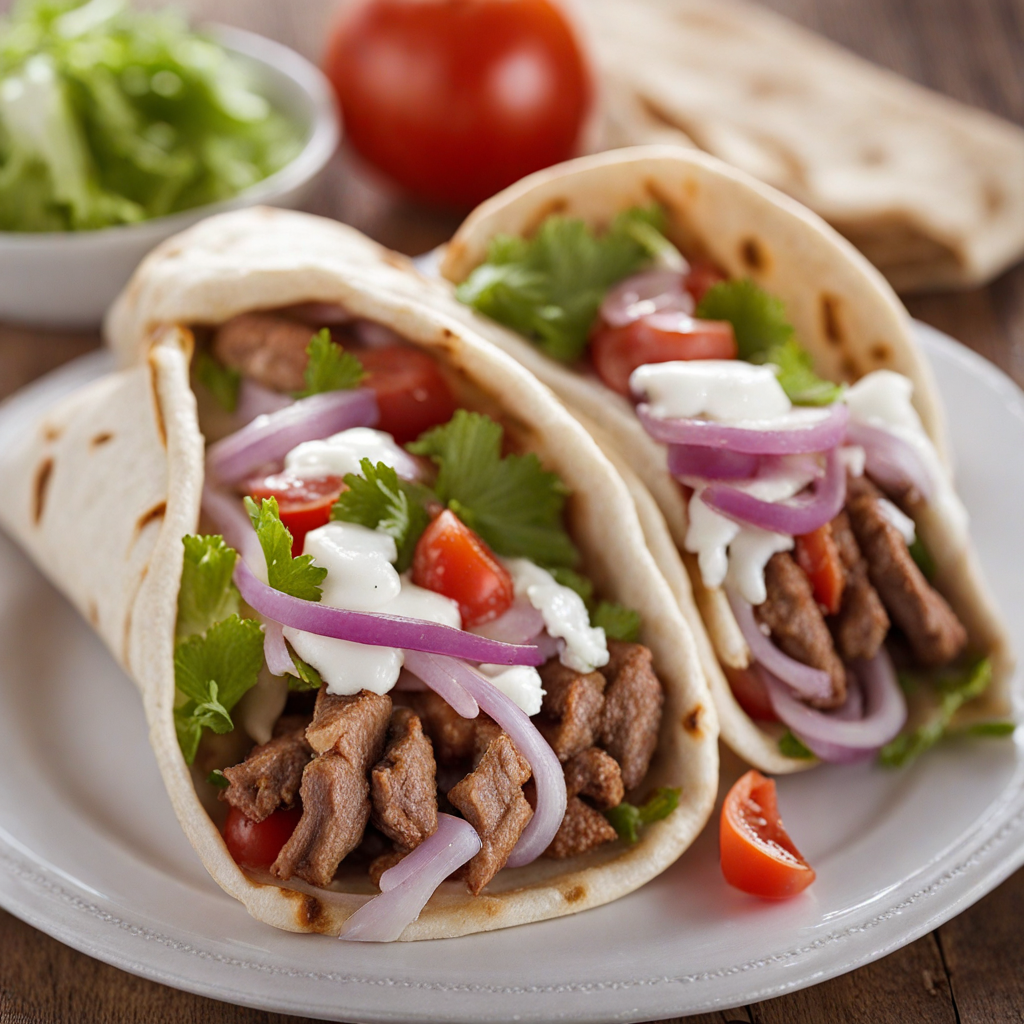Fasolada
Fasolada is a traditional Greek dish that is often hailed as the national soup of Greece, showcasing the country's rich culinary heritage. At its core, Fasolada is a hearty bean soup made primarily from plump, white beans, typically the gigante variety, which are known for their creamy texture and ability to absorb flavors. The dish is simmered with a medley of aromatic vegetables, including onions, carrots, and tomatoes, which contribute to its vibrant color and robust flavor profile. Olive oil, a staple in Greek cuisine, is generously drizzled into the pot, adding richness and depth, while a hint of tomato paste enhances the sweetness of the fresh tomatoes used in the recipe. The preparation of Fasolada is both simple and inviting, often involving the slow cooking of beans until they reach a tender state, allowing them to meld beautifully with the other ingredients. Herbs such as parsley, oregano, and bay leaves introduce layers of flavor, while a touch of salt and pepper brings the dish to life. Served hot, Fasolada is often garnished with fresh parsley and a squeeze of lemon, which brightens the soup and balances the earthiness of the beans. The resulting dish is not only nourishing but also comforting, making it a perfect meal for any season, especially during the cooler months. Fasolada is more than just a meal; it embodies the essence of Greek cuisine, emphasizing the use of fresh, wholesome ingredients that celebrate the Mediterranean diet. It is typically enjoyed with crusty bread, making it an ideal choice for a light lunch or dinner. Whether you are a seasoned fan of Mediterranean flavors or a newcomer eager to explore, Fasolada offers a delightful journey through Greece's culinary landscape, inviting you to savor the warmth and simplicity that defines this beloved dish.
How It Became This Dish
The Rich History of Φασολάδα: Greece's Bean Soup Origins: A Culinary Gift from the Gods Φασολάδα, a traditional Greek bean soup, is often affectionately regarded as the national dish of Greece. Its name derives from the Greek word "φασόλι," which means "bean." The origins of this hearty, nutritious dish can be traced back to ancient Greece, where beans were a staple food. Archaeological evidence suggests that beans were cultivated in the region as early as 4000 BCE. They were not merely a common food item but also a symbol of prosperity and abundance. In ancient times, beans held significant cultural value. The philosopher Pythagoras famously promoted a vegetarian diet that emphasized legumes, particularly beans, for their health benefits. The Greeks believed beans had a divine connection; they were often associated with the goddess Demeter, the deity of agriculture and fertility. Such reverence for beans laid the foundation for what would become a beloved dish in the centuries to follow. Cultural Significance: A Comfort Food for All Φασολάδα is more than just a dish; it embodies the spirit of Greek hospitality and community. Traditionally, it is a comfort food, enjoyed in homes and shared among families, especially during the colder months. The dish is incredibly versatile, allowing for numerous regional variations based on local ingredients and personal preferences. However, the heart of Φασολάδα remains the same: white beans, usually of the cannellini or navy variety, cooked slowly to achieve a creamy texture, often accompanied by a medley of vegetables, herbs, and olive oil. Culturally, Φασολάδα has deep roots in the Greek Orthodox tradition. It is frequently prepared during fasting periods, particularly Lent, when meat and dairy products are avoided. The dish serves as a hearty, nutritious meal that sustains the faithful during these times. In this context, Φασολάδα represents not only sustenance but also resilience and community, as families come together to share meals made from humble ingredients. Development Over Time: A Culinary Evolution As Greece evolved through various historical phases—ranging from the Byzantine Empire to Ottoman rule—so too did Φασολάδα. The Byzantine period saw the introduction of spices, herbs, and additional ingredients, which contributed to the dish's complexity. The use of tomatoes, for instance, became popular after the introduction of the tomato to Europe in the 16th century, further enriching the flavor profile of Φασολάδα. The dish was also influenced by regional agricultural practices. In coastal areas, seafood might be added, while in mountainous regions, herbs such as rosemary and thyme would impart distinct flavors. The post-World War II era marked a significant turning point for Greek cuisine, and Φασολάδα became a symbol of the country’s recovery. As Greece sought to reclaim its culinary identity, traditional dishes like Φασολάδα were celebrated as staples of Greek culture. During the 20th century, particularly in the 1950s and 60s, there was a resurgence in the appreciation for traditional Greek cuisine. Cookbooks began to feature Φασολάδα prominently, and it gained popularity not only in Greece but also among the Greek diaspora. The dish became a means of cultural expression, connecting Greeks around the world to their homeland through shared flavors and memories. The Modern Era: A Dish for the Ages Today, Φασολάδα remains a beloved dish, enjoyed by both young and old. Its recipe has been passed down through generations, often with families adding their unique twists. In contemporary Greek cuisine, chefs have embraced the dish, elevating it to fine dining status by incorporating gourmet ingredients or innovative presentation techniques while still honoring its rustic roots. Furthermore, in an age where health-conscious eating is at the forefront of culinary trends, Φασολάδα stands out as a nutritious option. Packed with protein, fiber, and essential vitamins, the dish appeals to vegetarians, vegans, and anyone seeking a wholesome meal. This adaptability has allowed Φασολάδα to maintain its relevance in a rapidly changing food landscape. Reheating Tradition: The Cultural Revival The global interest in Mediterranean diets has led to a renewed appreciation for traditional Greek dishes, including Φασολάδα. Food festivals celebrating Greek cuisine often showcase this dish, highlighting its role in the Mediterranean diet, which emphasizes fresh, local ingredients and healthy fats, primarily from olive oil. Moreover, as Greece continues to navigate modern challenges, from economic fluctuations to a growing tourism sector, Φασολάδα serves as a culinary ambassador. It represents the warmth of Greek hospitality and the importance of sharing food as an expression of love and community. Restaurants across Greece and abroad feature the dish, ensuring that its legacy endures as new generations discover this timeless treasure. Conclusion: A Legacy of Flavor and Tradition Φασολάδα is more than just a bean soup; it is a narrative of history, culture, and resilience woven into the fabric of Greek identity. From its ancient origins to its modern iterations, the dish has evolved while remaining true to its roots. As a symbol of sustenance, community, and tradition, Φασολάδα continues to be a beloved staple on Greek tables, embodying the essence of a culture that cherishes its culinary heritage. In a world increasingly focused on fast food and transient culinary trends, Φασολάδα reminds us of the importance of slow cooking, shared meals, and the stories that food carries. Whether savored on a cold winter's night or served at a festive gathering, the rich history and cultural significance of Φασολάδα ensure that it will remain a cherished dish for generations to come.
You may like
Discover local flavors from Greece







